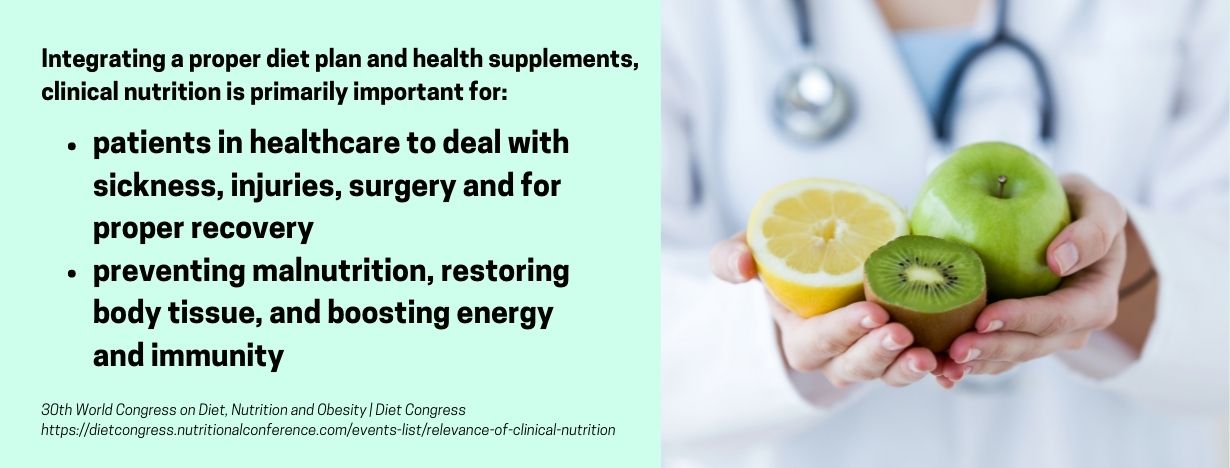At present, most universities and colleges offer online Doctor of Clinical Nutrition (D.C.N.) degree programs in a hybrid form. It means that there are online classes available, but students are also required to complete residencies and attend occasional on-campus workshops.
100% online programs are practically non-existent in the case of this course of studies due to general requirements.

Growing health awareness also means a growing demand for nutrition experts. Who hasn’t tried following a diet at least once in their life?
We don’t like it when our clothes shrink in the dryer (that’s what we tell ourselves), and while it may not be healthy for all of us to look like supermodels, it is good to make sure that your body is doing well.
Following a diet is not easy, especially in the beginning, but it’s absolutely necessary for optimum health and overall well-being. Whether you often get sick, train for a sporting event, or want to fit in your last year’s jeans, you may find yourself in need of help. Here’s when clinical nutritionists come in.
But it may happen that you are on the other side of this equation. If you are passionate about health and the right nutrition and you feel like you could help others, following the career path of a clinical nutritionist may be the right choice for you.
It is already an integral part of the whole healthcare industry, and we can only expect its importance to continue to grow.
Doctor of Clinical Nutrition degree programs provide advanced training in nutrition science and therapeutic diets to prepare graduates for successful careers as leaders in the nutrition field.
These programs enable graduates to help people understand and improve their health through food and nutrition education and to gain the necessary credentials to become dietitians or nutritionists.
5 Best Schools for Doctor of Clinical Nutrition (DCN) Degrees
UNIVERSITY OF NORTH FLORIDA

DOCTORATE IN CLINICAL NUTRITION
School Highlights: The University of North Florida’s Doctor of Clinical Nutrition online program emphasizes evidence-based practice, research, and leadership. Students learn the skills necessary to take on roles in the community, clinical, or higher education environments.
The curriculum is incredibly thorough and includes topics in the most crucial areas of nutrition, such as chronic disease prevention, cultural competency, and clinical treatment. This program can be completed full or part-time.
Students can only be admitted into the program if they have a master’s degree from an accepted institutional accreditor and a GPA of 3.0 or higher in the last 60 credit hours of their undergraduate study.
The coursework is completed 100% online, aside from the practice residency and the two-day workshops scheduled during the initial three years of the program.
Since it is offered fully online with a practice residency, students need to ensure that there is a State Authorization for Distance Education and whether they will be able to do a residency in their home state or elsewhere.
This rigorous doctoral degree ensures that graduates have a comprehensive understanding of clinical nutrition and its application in diverse settings and communities.
Coursework Sample:
- Advanced Leadership & Public Policy
- Teaching Nutrition in Higher Education
- Grant Development
Campus Location: Jacksonville, FL
Accreditation:
- Southern Association of Colleges and Schools Commission on Colleges (SACSCOC)
Did You Know?
The University of North Florida offers primarily and fully online degree and certificate programs designed to provide high-quality learning experiences for students in Florida and beyond.
The graduate programs offered online are quite extensive. It includes a Doctor of Clinical Nutrition, Master of Science in Nursing Leadership, and Master of Science in Logistics and Supply Chain Management, among many others.
LEARN MORE ABOUT THE UNIVERSITY OF NORTH FLORIDA’S DOCTORATE IN CLINICAL NUTRITION HYBRID PROGRAM
MARYLAND UNIVERSITY OF INTEGRATIVE HEALTH

DOCTOR OF CLINICAL NUTRITION
School Highlights: The Maryland University of Integrative Health provides a professionally oriented, hybrid-format Doctor of Clinical Nutrition.
It is designed to give post-graduate students a comprehensive approach to the profession, with coursework in functional nutrition, research, and publishing. The curriculum also requires the publication of original, peer-reviewed research in scientific journals.
The program is available to those who hold a master’s degree or to registered dieticians and registered nutritionists whose highest degree is a bachelor’s degree. The latter can enter the program without having to earn a master’s degree as a prerequisite for admission.
As a hybrid program, students must attend campus for four extended weekends for live learning sessions. Otherwise, the coursework, internships, and clinical requirements are all completed in individual home communities.
Graduates from MUIH demonstrate the ability to apply integrative and functional nutrition principles and provide advanced nutritional care for gastrointestinal, cardio-metabolic, immune, and neurologic issues, as well as many others.
Coursework Sample:
- Designing Research in Clinical Practice
- Nutritional Approaches to Detoxification
- Epigenetics and Nutritional Genomics
Campus Location: Laurel, MD
Accreditation:
- Middle States Commission on Higher Education
Did You Know?
The Maryland University of Integrative Health is recognized as one of the leading academic institutions for integrative health in the country. It has educated practitioners and leaders in health and wellness since 1974 by offering transformative programs from a blend of traditional wisdom and contemporary science.
The university considers itself a healing presence through caring for patients and clients in the Natural Care Center, found within its campus. This is where licensed and certified professionals, along with student interns, practice under faculty supervision.
LEARN MORE ABOUT MARYLAND UNIVERSITY OF INTEGRATIVE HEALTH’S DOCTOR OF CLINICAL NUTRITION HYBRID PROGRAM
RUTGERS UNIVERSITY

PhD OF CLINICAL NUTRITION
School Highlights: Rutgers University is an outstanding, historically American institution of higher education.
The Doctorate in Nutrition and Dietetics programs are some of the highest quality in the nation, and the Online Doctor of Clinical Nutrition was the very first of its kind. The curriculum is designed for Registered Dietitian Nutritionists, specifically, and is strongly clinically focused.
With an emphasis on inter-professional collaboration and evidence-based practice, this clinical nutrition program can be completed by meeting its requirements, including online academic courses, advanced clinical practice residency, and practice-based research projects.
At the end of the program, students are expected to demonstrate their knowledge by becoming advanced dietetics practitioners for individuals, communities, and clinical populations.
However, Rutgers also offers a Master of Science in Clinical Nutrition (MSCN) to Doctor of Clinical Nutrition (DCN) Dual Enrollment Program for undergraduate students. Coursework enhances skills in innovative, advanced, and autonomous research and practice.
There is also a particularly strong emphasis on interprofessional collaboration and evidence/practice-based research.
Coursework Sample:
- Lactation Education
- Nutritional Management of Nonalcoholic Fatty Liver Disease in Children
- Weight Management and Disordered Eating
Campus Location: New Brunswick, NJ
Accreditation:
- Middle States Commission on Higher Education
Did You Know?
Rutgers University, through its School of Health Professions, offers innovative and collaborative activities, including didactic and experiential exposure. This is more commonly known as Interprofessional Education, focusing on students’ exposure to roles and responsibilities, effective communication, and teamwork.
They facilitate encounters or case conferences on a variety of health conditions several times a year. This is in an effort to showcase the necessity of a wide variety of disciplines working together to advance the welfare of patients and their caregivers or families as they navigate the complex healthcare system.
LEARN MORE ABOUT RUTGERS UNIVERSITY’S DOCTORAL DEGREE IN CLINICAL NUTRITION
UNIVERSITY OF KANSAS

DOCTORAL IN CLINICAL NUTRITION
School Highlights: The University of Kansas provides a doctoral curriculum in Clinical Nutrition that is designed for currently working professionals and registered dietitians.
The entire program is offered 100% online, with only one required visit to campus for orientation. The coursework focuses on all of the most pivotal techniques and knowledge in today’s interdisciplinary healthcare system.
To be admitted, potential students must possess current professional RDN licensure and have completed a master’s degree. Students are required to complete 48 credit hours within a maximum of 8 years and meet a cumulative grade-point average of at least 3.0 across all their graduate coursework.
Students have access to the University of Kansas Medical Center, which operates as a comprehensive, state-of-the-art training and research facility and is home to the Doctorate in Clinical Nutrition.
Graduates are prepared to work in college and university settings or as practicing clinical nutritionists while working through in-depth, cutting-edge, outcomes-based research projects.
Coursework Sample:
- Health Behavior Counseling
- Nutrigenomics & Nutrigenetics in Health and Disease
- Pharmacology in Clinical Nutrition
Campus Location: Kansas City, KS
Accreditation:
- Higher Learning Commission
Did You Know?
The Kansas University School of Health Professions, located on the University of Kansas Medical Center campus, offers more than 25 healthcare programs, including five nationally ranked graduate programs.
They have a very strong research tradition, seeking to advance science, improve clinical care, and contribute to healthcare teaching and scholarship. Their research programs include Dietetics and Nutrition, Clinical Laboratory Sciences, and Occupational Therapy Education, among others.
LEARN MORE ABOUT THE UNIVERSITY OF KANSAS’ DOCTORATE IN CLINICAL NUTRITION
FAIRFIELD UNIVERSITY

DOCTORATE IN CLINICAL NUTRITION (DCN)
School Highlights: This Doctorate in Clinical Nutrition is an advanced practice degree that highlights evidence-based research and practice, as well as leadership.
It is one of the only programs of its kind to be accredited by the ACEND. The program offers an on-campus interprofessional education environment for both full-time and part-time students.
It is designed to improve the skills and knowledge of masters-level students to become Registered Dietitian Nutritionists. It is also open to students with a bachelor’s degree who have completed the required prerequisites, as well as Registered Dietitians without a master’s.
The curriculum emphasizes serving underprivileged communities, which gives graduates the tools necessary to institute positive changes in their eating habits. Fairfield alumni are prepared to work in any number of settings, such as business and industry, education, public health, government agencies, and more.
Coursework Sample:
- Nutritional Biochemistry
- Information Technology for Healthcare Improvement
- Food Systems Practicum
Campus Location: Fairfield, CT
Accreditation:
- New England Commission of Higher Education
- Accreditation Council for Education in Nutrition and Dietetics
Did You Know?
Fairfield University is perfectly located in the picturesque New England town of Fairfield. It is just a mile away from the beach and an hour’s ride from New York City, making it one of the perfect college towns in the country.
Students can easily explore it by foot, but they will never run out of things to do. They are also well-positioned to enjoy numerous internship and employment opportunities as Fairfield belongs to a region with the largest concentration of Fortune 500 companies in the United States.
LEARN MORE ABOUT FAIRFIELD UNIVERSITY’S DOCTORATE IN CLINICAL NUTRITION
Frequently Asked Questions
What does a Clinical Nutritionist do?

If you decide to work as a clinical nutritionist, you will be responsible for promoting healthy eating habits, which is much more than simply incorporating more fruits and vegetables into your diet. In some communities, people have no idea how to prepare healthy meals and are entirely unaware of how their choices affect their bodies.
There are those who still think that if you are not overweight, then everything is fine, but a healthy, well-nourished organism is about so much more than maintaining a healthy weight.
A clinical nutritionist or dietician is trained to find the correct approach to teach others about healthy nutritional choices to help them maintain a healthy and strong body that will always be capable of fighting diseases, infections, and more.
As a nutritionist, you will make individual nutritional assessments to be able to develop a personalized eating plan for each client based on their medical history, the current state of their health, lifestyle, and future goals.
The most common job opportunities involve helping people achieve their ideal weight or prepare for a special event, such as a marathon run. Additionally, a nutritionist is very often hired to plan meals for people with specific medical needs, such as diabetes, celiac disease, kidney disease, or food allergies.
How do I earn my Doctor of Clinical Nutrition degree?
You can easily find an entry-level job as a nutritionist only with your bachelor’s degree. However, all healthcare practitioners are essentially required to keep advancing in their fields. With the development of technology and medicine, it is hard to stay afloat if you don’t keep educating yourself.
Enrolling in a Doctor of Clinical Nutrition degree program is an excellent way to broaden your knowledge, but it is only for those the most ambitious and hungry for new information.
Pursuing a doctorate degree will allow you to conduct extensive research, explore the areas that interest you the most, teach at the university level, obtain a consulting or administrative position, and gain general recognition in the field. Earning a doctoral degree will also increase your potential salary.
Prerequisites for the D.C.N. program include a bachelor’s or master’s degree in nutrition or another health-related field. Areas of study may include:
- the biochemistry of nutrients,
- kinesiology,
- eating disorders,
- human metabolism,
- nutritional epidemiology,
- anatomy,
- microbiology,
- statistics,
- metabolic imbalance,
- and cellular nutrition.
You will also focus on:
- the compounds in various foods and their effects on the human body,
- the links between nutrition and aging,
- weight management,
- as well as the importance of proper nutrition in pediatrics, geriatric, maternity, and critical care.
What salary and career options will I have with my Clinical Nutrition Doctorate degree?
Clinical nutritionists can find employment in various clinics, hospitals, doctor’s offices, schools, correctional facilities, spas, nursing homes, and other governmental health agencies. There are many areas of expertise in which a clinical nutritionist can specialize.
For example, you may choose to work as:
- a sports nutritionist,
- public health nutritionist,
- weight loss consultant,
- naturopathic nutritionist,
- pharmaceutical product representative,
- or holistic consultant who deals with organically grown foods.
What is interesting, it is not uncommon for clinical nutritionists to become registered nurses. It is a demanding job, often depending on a patient’s individual needs, but the working hours can be very flexible.
In today’s world, more and more people are becoming health-conscious. With this growing trend, additional nutritionists will be needed. The B.L.S. reports that this career has a potential growth rate of 7% between 2022 and 2032.
The average salary for a nutritionist or a dietitian was $66,450 annually as of May 2022, although the leading 10% earned as much as up to $95,130 per year.
Do I need to have a license to be a Clinical Nutritionist?

Most states will require a kind of certificate, licensure, or at least registration. If you plan to practice as a nutritionist or a dietitian, make sure to check your state’s regulations for specifics.
However, a certificate is not always the same as a certification.
Getting a certificate may be brief; it is very often about simply broadening the knowledge you already possess. For example, as a nutritionist, you may get a certificate to specialize, for example, in sports nutrition or nutrition for children.
But there’s also something called a National Certification, which is awarded to you by a regulated professional organization if you can prove that you have completed the necessary level of education and gained the much-needed experience in the field. In many cases, you will also need to pass a test. Several national certifications will require you to already possess your state’s licensure.
What schools offer Doctor of Clinical Nutrition programs?
Please, note that there are not any Doctor of Clinical Nutrition programs available 100% online. There will always be some on-campus or residency requirements for future nutritionists.
There are two schools offering a hybrid learning format in the U.S. at present. These are the Maryland University of Integrative Health, located in Laurel, Maryland, and the University of North Florida in Jacksonville, Florida. The former requires only a residency, but the latter requires a residency as well as attendance during some on-campus workshops.
On-campus doctoral degrees in clinical nutrition can be found at Rutgers University in New Brunswick, New Jersey, Fairfield University in Fairfield, Connecticut, and the University of Kansas in Kansas City, Kansas.
What is the difference between a Nutritionist and a Dietitian?
The role of a dietitian, especially a registered dietitian, is more regulated than that of a nutritionist. A dietary doctor needs to acquire more official licenses or certifications to even be able to practice at all.
To use the title of a Doctor, whether as a dietitian or nutritionist, you need to have proof of your qualifications, which is an academic degree.
A dietary doctor and a doctor of clinical nutrition will have similar jobs, including diagnosing and treating some nutrition-related diseases. At the same time, a regular nutritionist can only help you with your diet and shouldn’t be involved in the treatment process.
What are the benefits of pursuing a career as a Clinical Nutritionist?
If you are interested in pursuing a career in the field of Clinical Nutrition, consider these benefits, such as:
- Help people improve their health: Being a clinical nutritionist can provide great satisfaction from helping people improve their physical and mental health through nutrition education.
- Career Growth Potential: Clinical nutrition offers an ever-expanding field with plenty of room to grow and expand into different specializations.
- Flexibility: Clinical nutrition allows for a great deal of flexibility in terms of where you can work and the hours you work. You can work in a clinical setting, as part of a research team, in private practice, or as a consultant.
- Variety: Clinical nutrition offers great variety, from consulting with individual clients to presenting seminars and public speaking engagements.
- Job Security: The demand for clinical nutritionists is growing due to the increasing awareness of the importance of nutrition and its impact on an individual’s health. This point solidifies the notion that a career in clinical nutrition is secure.
Conclusion
If you want to follow the career path of a nutritionist, dietitian, researcher, or educator, you absolutely must have a genuine interest in helping others. To excel in the field of clinical nutrition, you need to be compassionate and caring, as you will be expected to work closely with people who are ill, very often severely or even terminally.
Apart from that, your state may require you to keep educating yourself so that you are always up-to-date with the newest medications, solutions, and approaches. And even if the state you live in doesn’t demand this from you, your patients and clients surely will.
Check these out, too:
- The Best Doctor of Athletic Training (D.A.T.) Degree Programs
- The Best Doctor of Acupuncture (D.Ac., D.Acu.) Degree Programs
- The Best Doctor of Health Education (D.H.Ed) Degree Programs: Salary and Information
Additional Information:
- The Best Online Schools for Doctor of Pastoral Counseling (D.PC)
- The Best Doctor of Sacred Theology (S.T.D.) / Canon Law Degree Programs: Salary and Information
- The Best Online Schools for Doctorate in Theology (D.Th.) Degree Programs
